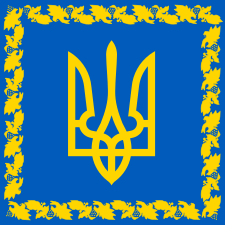Leonid Kuchma
Leonid Danylovych Kuchma (Ukrainian: Леоні́д Дани́лович Ку́чма; born 9 August 1938) is a Ukrainian politician who was the second President of independent Ukraine from 19 July 1994 to 23 January 2005. Kuchma took office after winning the 1994 presidential election against his rival, the incumbent Leonid Kravchuk. Kuchma won re-election for an additional five-year term in 1999.
Leonid Kuchma | |
|---|---|
Леонід Кучма | |
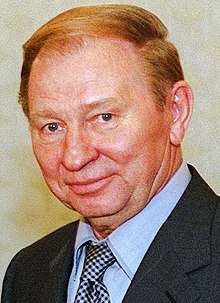 Kuchma in 2019 | |
| Representative of Ukraine in the Trilateral Contact Group on Ukraine | |
| In office 3 June 2019 – 28 July 2020 | |
| President | Volodymyr Zelensky |
| Succeeded by | Leonid Kravchuk |
| President of Ukraine | |
| In office 19 July 1994 – 23 January 2005 | |
| Prime Minister | Vitaliy Masol Yevhen Marchuk Pavlo Lazarenko Valeriy Pustovoitenko Viktor Yushchenko Anatoliy Kinakh Viktor Yanukovych |
| Preceded by | Leonid Kravchuk |
| Succeeded by | Viktor Yushchenko |
| Prime Minister of Ukraine | |
| In office 13 October 1992 – 22 September 1993 | |
| President | Leonid Kravchuk |
| Deputy | Ihor Yukhnovskyi Yukhym Zvyahilsky |
| Preceded by | Valentyn Symonenko (Acting) |
| Succeeded by | Yukhym Zvyahilsky (Acting) |
| General Director of Yuzhmash | |
| In office November 1986 – 13 October 1992 | |
| Preceded by | Aleksandr Makarov |
| Succeeded by | Yuriy Alekseyev |
| People's Deputy of Ukraine | |
| 1st convocation | |
| In office 15 May 1990 – 10 May 1994 | |
| Constituency | Communist Party (until August 1991), Dnipropetrovsk Oblast, District No.81[1] |
| People's Deputy of Ukraine | |
| 2nd convocation | |
| In office 10 May 1994 – 15 July 1994 | |
| Constituency | Independent, Chernihiv Oblast, District No.448[2] |
| Personal details | |
| Born | Leonid Danylovych Kuchma 9 August 1938 Chaikyne, Novhorod-Siverskyi Raion, Ukrainian SSR, Soviet Union |
| Political party |
|
| Spouse(s) | Lyudmila Talalayeva |
| Children | Olena Pinchuk |
| Alma mater | Dnipropetrovsk National University |
| Signature |  |
After a successful career in the machine-building industry of the Soviet Union, Kuchma began his political career in 1990, when he was elected to the Verkhovna Rada (the Ukrainian parliament); he was re-elected in 1994.[3] He served as Ukrainian Prime Minister between October 1992 and September 1993.[3] Kuchma's presidency was surrounded by numerous corruption scandals and the lessening of media freedoms. Corruption accelerated after Kuchma's election in 1994, but in 2000–2001, his power began to weaken in the face of exposures in the media.[4] During his leadership, the Ukrainian economy continued to decline until 1999, whereas growth was recorded since 2000, bringing relative prosperity to some segments of urban residents. During his presidency, Ukrainian-Russian ties began to improve.[5]
Between 2014 and 2020, Kuchma was a special presidential representative of Ukraine at the semi-official peace talks regarding the ongoing War in Donbass.
Early life
Leonid Kuchma was born in the village of Chaikine in rural Chernihiv Oblast.[6] His father Danylo Prokopovych Kuchma (1901–1942) was wounded in World War II and eventually died of his wounds in the field hospital #756 (near the village of Novoselytsia) when Leonid was four.[7][8] His mother Paraska Trokhymivna Kuchma worked at a kolhoz. Kuchma attended the Kostobobrove general education school in the neighboring Semenivka Raion. Later he enrolled in Dnipropetrovsk National University and graduated in 1960 with a degree in mechanical engineering (majoring in aerospace engineering).[9] The same year he joined the Communist Party of Soviet Union.[10] Kuchma is a candidate of technical sciences.
In 1967, Kuchma married Lyudmyla.[11]
Career
After graduation, Kuchma worked in the field of aerospace engineering for the Yuzhnoye Design Bureau in Dnipropetrovsk. At 28 he became a testing director for the Bureau deployed at the Baikonur cosmodrome.
Some political observers suggested that Kuchma's early career was significantly boosted by his marriage to Lyudmila Talalayeva, an adopted daughter of Gennadiy Tumanov, the Yuzhmash chief engineering officer and later the Soviet Minister of Medium Machine Building.[12][13]
At 38 Kuchma became the Communist party chief at Yuzhny Machine-building Plant and a member of the Central Committee of the Communist Party of Ukraine. He was a delegate of the 27th and 28th Congresses of the Communist Party of Soviet Union. By the end of the 1980s, Kuchma openly criticized the Communist Party.[14]
In 1982 Kuchma was appointed the first deputy of general design engineer at Yuzhmash, and from 1986 to 1992, he held the position of the company's general director. From 1990 to 1992, Kuchma was a member of the Verkhovna Rada (Ukraine's parliament). In 1992 he was appointed as Prime Minister of Ukraine.[14] He resigned a year later, complaining of "slow pace of reform".[14] He was re-elected into parliament in 1994.[3]
President (1994–2005)
Kuchma resigned from the position of Prime Minister of Ukraine in September 1993 to run for the presidency in 1994 on a platform to boost the economy by restoring economic relations with Russia and faster pro-market reforms. Kuchma won a clear victory against the incumbent President Leonid Kravchuk, receiving strong support from the industrial areas in the east and south. His worst results were in the west of the country.[14]
Kuchma was re-elected in 1999 to his second term.[3][14] This time the areas that gave him strongest support last time voted for his opponents, and the areas which voted against him last time came to his support.[14]
During Kuchma's Presidency, he closed opposition papers and several journalists died in mysterious circumstances.[15] According to historian Serhy Yekelchyk President Kuchma's administration "employed electoral fraud freely" during the 2000 constitutional referendum and 1999 presidential elections.[16]
 Results in the Second round of the 1994 presidential election: Blue – Leonid Kuchma, orange – Leonid Kravchuk
Results in the Second round of the 1994 presidential election: Blue – Leonid Kuchma, orange – Leonid Kravchuk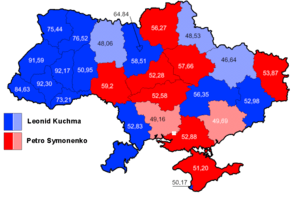 Results in the Second round of the 1999 presidential election: Blue – Leonid Kuchma, red – Petro Symonenko
Results in the Second round of the 1999 presidential election: Blue – Leonid Kuchma, red – Petro Symonenko
Domestic policy
In October 1994, Kuchma announced comprehensive economic reforms, including reduced subsidies, lifting of price controls, lower taxes, privatization of industry and agriculture, and reforms in currency regulation and banking. The parliament approved the plan's main points. The International Monetary Fund (IMF) promised a $360 million loan to initiate reforms.
He was re-elected in 1999 to his second term. Opponents accused him of involvement in the killing in 2000 of journalist Georgiy Gongadze (see also SBU, "Cassette Scandal", Mykola Mel'nychenko), which he has always denied. Critics also blamed Kuchma for restrictions on press freedom. Kuchma is believed to have played a key role in sacking the Cabinet of Viktor Yushchenko by Verkhovna Rada on 26 April 2001.
Kuchma's Prime Minister from 2002 until early January 2005 was Viktor Yanukovych, after Kuchma dismissed Anatoliy Kinakh, his previous appointee.
Foreign policy
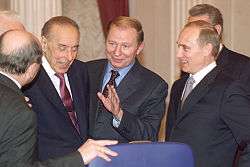
In 2002 Kuchma stated that Ukraine wanted to sign an association agreement with the European Union (EU) by 2003–2004 and that Ukraine would meet all EU membership requirements by 2007–2011.[17] He also hoped for a free-trade treaty with the EU.[17]
In his inaugural address Kuchma said:
Historically, Ukraine is part of the Euro-Asian cultural and economics space. Ukraine's vitally important national interests are now concentrated on this territory of the former Soviet Union. ... We are also linked with... the former republics of the Soviet Union by traditional scientific, cultural and family ties... I am convinced that Ukraine can assume the role of one of the leaders of Euro-Asian economic integration.[18]
Kuchma signed a "Treaty of Friendship, Cooperation, and Partnership" with Russia, and endorsed a round of talks with the CIS. Additionally, he referred to Russian as "an official language". He signed a special partnership agreement with NATO and raised the possibility of membership of the alliance.
After Kuchma's popularity at home and abroad sank as he became mired in corruption scandals, he turned to Russia as his new ally. He said that Ukraine needed a "multivector" foreign policy that balanced eastern and western interests.
Kuchma and the Cassette Scandal
From 1998 to 2000, Kuchma's bodyguard Mykola Melnychenko was allegedly eavesdropping Kuchma's office, later publishing the recordings. The release of the tapes – dubbed "Kuchmagate" by the Ukrainian press – supposedly revealed Kuchma's numerous crimes. In particular, his approving the sale of radar systems to Saddam Hussein (among other illegal arms sales) and ordering the Ukraine's police minister to "take care" of the journalist Georgiy Gongadze.
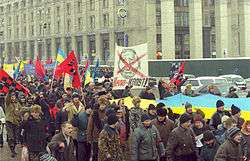
In September 2000, Gongadze disappeared and his headless corpse was found mutilated on 3 November 2000. On 28 November, the opposition politician Oleksandr Moroz publicised the tape recordings implicating Kuchma in Gongadze's murder. In 2005 the Ukrainian Prosecutor General's office instigated criminal proceedings against Kuchma and members of his former administration in connection with the murder of Gongadze.[19] In 2005 the press reported that Kuchma had been unofficially granted immunity from prosecution in return for his graceful departure from office in 2005.[20][21]
Critics of the tape point to the difficulty of Melnychenko recording 500 hours of dictaphone tape unaided and undetected, the lack of material evidence of said recording equipment, and other doubts which question the authenticity and motive of the release of the tape. Kuchma acknowledged in 2003 that his voice was one of those on the tapes, but claimed the tapes had been selectively edited to distort his meaning.[22] However, the United States ambassador to Ukraine, Carlos Pascual, revealed that the tapes are genuine, undistorted, unaltered, and not manipulated because of the conclusion from FBI Electronic Research Facility's analysis of the original recording device and the original recording found that there are not unusual sounds which would indicate a tampering of the recording, the recording is continuous with no breaks, and there is no manipulation of the digital files.[23][24]
The General Prosecutor of Ukraine's Office canceled its resolution to deny opening of criminal cases against Kuchma and other politicians within the Gongadze-case on 9 October 2010.[25] On 22 March 2011, Ukraine opened an official investigation into the murder of Gongadze and, two days later, Ukrainian prosecutors charged Kuchma with involvement in the murder.[26][27] A Ukrainian district court ordered prosecutors to drop criminal charges against Kuchma on 14 December 2011 on grounds that evidence linking him to the murder of Gongadze was insufficient.[28] The court rejected Melnychenko's recordings as evidence.[29] Gongadze's widow Myroslava Gongadze lodged an appeal against the ruling one week later.[30]
During the trial of Oleksiy Pukach for the murder of Gongadze, he claimed that Kuchma and Kuchma's head of his Presidential Administration, Volodymyr Lytvyn, were the ones who ordered the murder.[31][32] Pukach was convicted and sentenced to life imprisonment for his part in the murder of Gongadze.[31]
First Deputy Prosecutor General of Ukraine Renat Kuzmin claimed 20 February 2013 that his office had collected enough evidence confirming Kuchma's responsibility for ordering Gongadze's assassination.[33] Kuchma's reply the next day was, "This is another banal example of a provocation, which I've heard more than enough in the past 12 years".[33]
Role in the election crisis of 2004
Kuchma's role in the election crisis of 2004 is not entirely clear. After the second round on 22 November 2004, it appeared that Yanukovych had won the election by fraud, which caused the opposition and independent observers to dispute the results, leading to the Orange Revolution.
Kuchma was urged by Yanukovych and Viktor Medvedchuk (the head of the presidential office) to declare a state of emergency and hold the inauguration of Yanukovych. He denied the request. Later, Yanukovych publicly accused Kuchma of a betrayal. Kuchma refused to officially dismiss Prime Minister Yanukovych after the parliament passed a motion of no confidence against the Cabinet on 1 December 2004. Soon after, Kuchma left the country. He returned to Ukraine in March 2005.
Kuchma said in October 2009 he would vote for Victor Yanukovych at the 2010 Ukrainian presidential election.[34] In a document dated 2 February 2010 uncovered during the United States diplomatic cables leak, Kuchma in conversation with United States Ambassador to Ukraine John F. Tefft, called the voters' choice between Yanukovych and Yulia Tymoshenko during the second round of the 2010 presidential election as a choice between "bad and very bad" and praised (the candidate eliminated in the first round of the election) Arseniy Yatsenyuk instead.[35]
In September 2011 Kuchma stated that he believed that Yanukovych was the real winner of the 2004 election.[36]
Post-presidency
Leonid Kuchma has been active in politics since his presidency ended. He aligned himself with President Viktor Yushchenko in 2005,[37] but later raised concerns about the president in correspondence with then U.S. Ambassador to the Ukraine, John Tefft.[38] Kuchma endorsed Yanukovych for president in 2010.[39]
Involvement in the 2014 pro-Russian conflict in Ukraine
Kuchma represented Ukraine at negotiations with the armed separatists in the Donetsk and Luhansk provinces on 21 June 2014 to discuss President Petro Poroshenko's peace plan.[40][41] His role as a diplomat was received positively by the west and Russia as well as by the public in Ukraine.[42]
On 11 February 2015, Kuchma was one of the signatories of a draft plan to end the conflict in Donbas. The summit was known as Minsk II. The plan ensured that a ceasefire was implemented; reaction from leaders in Europe was generally positive.[43]
In March 2015, Kuchma delivered an address calling on the west for greater involvement in the region.[44] He criticized the action of Russian-backed forces in the attempt to seize the town of Debaltseve.[45]
Kuchma instigated the decommissioning of the Chernobyl power plant's reactor.
In September 2015 Kuchma was again appointed as the representative for Ukraine at the Trilateral Contact Group. The group met in Belarus to discuss ending the conflict in Donbas. The choice of Kuchma came nearly a decade after his presidency ended.
In early 2017, Kuchma spoke out against the transport blockade of Donbass.[46][47] In March 2017 at the Trilateral Contact Group (TCG) in Minsk, he demanded that the Russian Federation repeal their decree on the recognition of passports issued in separatist-held areas.[48]
On 2 October 2018, Kuchma stepped down as Ukraine's representative in the Trilateral Contact Group due to his age.[49] He returned to the talks in June 2019, at the request of newly elected Ukrainian president Volodymyr Zelensky and after mediation by Victor Pinchuk.[50][51]
Politicians closely associated with Kuchma
Aides and advisors that became public figures after or before
- Volodymyr Horbulin – personal friend, aide, later Head of the National Security and Defense Council
- Volodymyr Lytvyn – long-term first aide, later Head of Presidential Administration, then Speaker of the Verkhovna Rada
- Viktor Medvedchuk – business oligarch, then First Vice Speaker of Verkhovna Rada, later Head of Presidential Administration (2001–2004)
- Dmytro Tabachnyk – manager of the Kuchma's first successful election campaign, later Head of Presidential Administration, then Vice Prime Minister;,[52] Minister of Science and Education (2010-2014)
Influential statesmen
- Leonid Derkach – personal friend, Head of the Security Service of Ukraine
- Yuri Kravchenko – Minister of Internal Affairs (police chief), committed suicide after the fall of Kuchma's regime
- Oleksandr Omelchenko – long-term governor and mayor of Kiev
Business oligarchs and managers of important state-owned companies
- Ihor Bakai – business oligarch, later head of Naftogas of Ukraine national gas and oil company, then Head of the State Accommodation Department, escaped to Russia after the fall of Kuchma's regime, refusing to return permanently
- Heorhiy Kirpa – long-term head of the Ukrzaliznytsia national railways, then Minister of Transportation, committed suicide after the fall of Kuchma's regime
- Viktor Pinchuk – second son-in-law, business oligarch in control of several important media
Family and personal life
Leonid Kuchma is married to Lyudmyla Kuchma since 1967.[11] She is the Honorary President of the National Fund of Social Protection of Mothers and Children, "Ukraine to Children"[53] and is also known as a paralympic movement in Ukraine supporter.[11]
Kuchma's only child, daughter Olena Pinchuk, is married to Viktor Pinchuk, an industrialist and philanthropist whose Victor Pinchuk Foundation regularly hosts Ukraine-dedicated and philanthropic fora at the annual World Economic Forum in Davos. Olena Pinchuk has a son Roman (born in 1991, from her previous marriage with Ukrainian businessman Igor Franchuk) who attends Brown University, and two daughters with Viktor Pinchuk, Katerina (born in 2003) and Veronica (2011). Olena Pinchuk founded the ANTIAIDS Foundation in 2003.[54] According to the Ukrainian magazine Focus, Olena Pinchuk was amongst the "top 10 most influential women" in Ukraine as of 2010.[55]
Victor Pinchuk recently made headlines when it was revealed that one of his lobbyists was previously picked by Donald Trump for national security aide.[56][57]
Kuchma was an amateur guitar player in his younger years. He was also known for his skill at the complicated card game preferans.
In 2003, he published his book Ukraine is not Russia (uk).
After retirement, Kuchma was allowed to keep the state-owned dacha in Koncha-Zaspa for his personal use upon completion of his state duties.[58] The government order #15-r that would allow for Kuchma to keep his estate was signed by the acting prime-minister Mykola Azarov on 19 January 2005. Kuchma was also allowed to keep his full presidential salary and all the service personnel, along with two state-owned vehicles. That order also stated that these costs would be paid out of the state budget.
Awards
.svg.png)
Kuchma was awarded the Azerbaijani Istiglal Order for his contributions to Azerbaijan-Ukraine relations and strategic cooperation between the states by President of Azerbaijan Heydar Aliyev on 6 August 1999.[59]
- Ukrainian Honours
- Order of the Ukrainian Orthodox Church (Moscow Patriarchate) of St. Ilya of Murom, 1st class (2004)
- Honorary Citizen of the Donetsk Oblast (2002)
- Foreign Honours
- Knight Grand Cross with Grand Cordon of the Order of Merit of the Italian Republic (3 May 1995)
- Order of Merit for the Fatherland, 1st class (Russia, 20 April 2004) – for his contribution to strengthening friendship and cooperation between Russia and Ukraine
- Grand Cross of the Order of Vytautas the Great (Lithuania, 20 September 1996)[60]
- Grand Cross of the Order of the Lithuanian Grand Duke Gediminas (Lithuania, 4 November 1998, Ludmila too)[60]
- Order of the Golden Eagle (Kazakhstan, 1999)
- Order of the Republic (Moldova, 2003)
- Order Laila Utama Dardzha Kerabat, 1st class (Brunei, 2004)
- Chain of the Order of Prince Henry (Portugal, 16 April 1998) 3 February 1999
- Order of the "Star of Bethlehem" (State of Palestine, 2000)
References
- "People's Deputy of Ukraine of the I convocation". Official portal (in Ukrainian). Verkhovna Rada of Ukraine. Retrieved 22 December 2014.
- "People's Deputy of Ukraine of the II convocation". Official portal (in Ukrainian). Verkhovna Rada of Ukraine. Retrieved 22 December 2014.
- "Profile: Leonid Kuchma". BBC. 26 September 2002.
- Adrian Karatnycky, "Ukraine's Orange Revolution," Foreign Affairs, Vol. 84, No. 2 (Mar. – Apr., 2005), pp. 35–52 in JSTOR
- Robert S. Kravchuk, "Kuchma as Economic Reformer," Problems of Post-Communism Vol. 52#5 September–October 2005, pp 48–58
- "Leonid Kuchma | president of Ukraine". Encyclopædia Britannica. Retrieved 13 January 2016.
- "single | The Jamestown Foundation". www.jamestown.org. Retrieved 13 January 2016.
- "Engology,Engineer, Leonid Kuchma - President of the Ukraine,". www.engology.com. Archived from the original on 23 September 2003. Retrieved 13 January 2016.
- "Profile: Leonid Kuchma". BBC. 26 September 2002. Retrieved 13 January 2016.
- Erlanger, Steven (12 July 1994). "UKRAINIANS ELECT A NEW PRESIDENT". The New York Times. ISSN 0362-4331. Retrieved 13 January 2016.
- First ladies of Ukraine, ITAR-TASS (6 June 2014)
- Бондаренко К. Леонід Кучма: портрет на фоні епохи. «Фоліо». Харків, 2007; стр. 21
- Деньги к деньгам: браки в украинской политике (UNIAN, 12 July 2007). Unian.net. Retrieved on 6 August 2011.
- "Profile: Leonid Kuchma". BBC. 29 October 1999.
- "Country profile: Ukraine", BBC News
- The Conflict in Ukraine: What Everyone Needs to Know by Serhy Yekelchyk, Oxford University Press, 2015, ISBN 0190237287 (page 87)
- EU-Ukraine Summits: 16 Years of Wheel-Spinning, The Ukrainian Week (28 February 2012)
- 'Leonid Kuchma sklav prysiagu na virnist' ukrains'komu narodovy', Holos Ukrainy, 21 July 1994.
- "Criminal Case Instigated Against Ukrainian Ex-President Kuchma". Mosnews.com. Archived from the original on 13 December 2005.
- Crouch, David (6 April 2005). "Secrets of journalist's murder cast long shadow over Ukraine's orange revolution", The Guardian. Retrieved on 6 August 2011.
- "Ukraine ex-leader charged over murder". Al Jazeera. 24 March 2011. Retrieved 24 March 2011.
- Eastern Europe, Russia and Central Asia 2004, (Europa Publications), Routledge, 12 December 2003, ISBN 1-85743-187-1 (page 504)
- Pascual, Carlos (26 November 2002). "U.S. Ambassador's to Ukraine open letter to the editor of 2000 Newspaper". danskukrainsk.dk (Dansk-Ukrainsk Selskab). Retrieved 17 January 2020.
- Koshiw, J.V. (12–13 October 2007). "Kuchma's 'Parallel Cabinet' – The center of President Kuchma's authoritarian rule based on the Melnychenko recordings" (PDF). pp. 16–17. Archived from the original (PDF) on 20 January 2012. Retrieved 17 January 2020.
- "Prosecutor general's office can open criminal cases against former President Leonid Kuchma and other politicians", Kyiv Post (October, 2010)
- "Ukraine's ex-president: Catching Kuchma". The Economist. 399 (8727): 25. 2–8 April 2011.
- "Ukraine's ex-leader Kuchma probed over Gongadze murder", BBC News (22 March 2011). Retrieved on 6 August 2011.
- "Court clears Kuchma of Gongadze murder charges", Kyiv Post (14 December 2011)
- "Court rejects Melnychenko's tapes as evidence in Gongadze case", Kyiv Post (14 December 2011)
- "Gongadze's widow appeals closure of criminal case against Kuchma", Kyiv Post (21 December 2011)
- "Court sentences Pukach to life for murdering Gongadze, disregards claims against Kuchma, Lytvyn", Kyiv Post (29 January 2013)
"Ukraine police officer accuses ex-president after being jailed for life", Reuters (29 January 2013)
Gongadze killer pointed on Kuchma and Lytvyn. "LIGABusinessInform". 2013-1-29 - "Former policeman 'carried out Georgiy Gongadze murder on behalf of Leonid Kuchma'", Telegraph.co.uk (1 September 2011)
- Ukraine's Leonid Kuchma 'implicated' in Gongadze death, BBC news (20 February 2013)
Kuchma outraged by reports alleging his arrest, Kyiv Post (21 February 2013) - Kuchma says he'll vote for Yanukovych as Ukraine's president, Kyiv Post (16 October 2009)
- "Kuchma: Yanukovych-Tymoshenko contest a choice between 'bad and very bad'", Kyiv Post (3 December 2010)
- Kuchma: Orange Revolution defines Ukrainians as Europeans, Kyiv Post (17 September 2011)
- Warner, Tom (12 September 2005). "Kuchma backs Yushchenko in Ukraine turmoil". Financial Times. ISSN 0307-1766. Retrieved 13 January 2016.
- "WikiLeaks: Former President Leonid Kuchma with U.S. Ambassador John Tefft". KyivPost. Retrieved 13 January 2016.
- "Kuchma campaigns for Yanukovych as president of Ukraine". KyivPost. Retrieved 13 January 2016.
- "NSDC Says Medvedchuk not Representing Ukraine at Peace Plan Talks". Ukrinform. 24 June 2014. Archived from the original on 30 May 2016. Retrieved 5 February 2019.
- Birnbaum, Michael (23 June 2014). "Separatists in Ukraine Agree to Honor Cease-fire". The Washington Post.
- "From Disgraced President to Ukraine's Lead Diplomat: The Unlikely Redemption of Leonid Kuchma". The Huffington Post. Retrieved 13 January 2016.
- "Ukraine crisis: Leaders agree peace roadmap - BBC News". BBC News. Retrieved 13 January 2016.
- "Ukraine's Kuchma Says West Too Soft on Russia Over Debaltseve". RadioFreeEurope/RadioLiberty. 5 March 2015. Retrieved 13 January 2016.
- "Ukraine crisis: 'Dozens killed' in east as Minsk talks held - BBC News". BBC News. Retrieved 13 January 2016.
- "Donbas blockade harmful for Ukraine - Kuchma". Interfax-Ukraine. Retrieved 4 May 2017.
- "Kuchma says Donbas blockade harmful for Ukraine | KyivPost". KyivPost. 28 February 2017. Retrieved 4 May 2017.
- "Kyiv insists on cancellation of separatists IDs recognition by Russia | KyivPost". KyivPost. 15 March 2017. Retrieved 4 May 2017.
- Ukraine's envoy to Minsk talks Kuchma going to quit, UNIAN (29 September 2018)
Kuchma concludes work as Ukraine's envoy to Minsk talks, UNIAN (2 October 2018) - https://www.unian.info/m/politics/10581132-zelensky-s-adviser-pinchuk-helps-to-persuade-kuchma-to-re-join-minsk-talks.html
- https://en.interfax.com.ua/news/general/660169.html
- In the cabinet of Yanukovych
- "About Us: Kuchma, Ludmila Molaivna". Ukraine for Children. 2004.
- "Elena Franchuk ANTIAIDS Foundation : The daughter of Kuchma will be fighting against AIDS and her husband Pinchuk will provide his media support" Archived 11 August 2011 at the Wayback Machine, Antiaids.org (28 November 2003), Retrieved on 6 August 2011
- 100 самых влиятельных женщин Украины. Рейтинг Фокуса Archived 30 June 2012 at WebCite, Focus.ua. Retrieved on 6 August 2011.
- "One-Time Trump National Security Pick Registers As Foreign Agent for Ukrainian Oligarch". Foreign Policy. Retrieved 4 May 2017.
- "Woman loses job with Trump, gets one with Ukrainian billionaire". The Independent. 15 March 2017. Retrieved 4 May 2017.
- Ukrayinska Pravda exposes president’s Mezhygirya deal, Kyiv Post (6 May 2009)
- "Ukraynanın Prezidenti Leonid Daniloviç Kuçmanın "İstiqlal" ordeni ilə təltif edilməsi haqqında AZƏRBAYCAN RESPUBLİKASI PREZİDENTİNİN FƏRMANI" [Order of the President of Azerbaijan Republic on awarding President of Ukraine Leonid Kuchma with Istiglal Order]. Archived from the original on 15 March 2012. Retrieved 20 January 2011.
- Lithuanian Presidency Archived 19 April 2014 at the Wayback Machine, Lithuanian Orders searching form
Further reading
- Åslund, Anders, and Michael McFaul.Revolution in Orange: The Origins of Ukraine's Democratic Breakthrough. (2006)
- Aslund, Anders. How Ukraine Became a Market Economy and Democracy. (2009)
- Birch, Sarah. Elections and Democratization in Ukraine. (2000) online edition
- Kubicek, Paul. The History of Ukraine. (2008) excerpt and text search
- Kuzio, Taras. Ukraine: State and Nation Building (1998) online edition
- Sochor, Zenovia A. "Political Culture and Foreign Policy: Elections in Ukraine 1994." in: Tismăneanu, Vladmir (ed.). 1995. Political Culture and Civil Society in Russia and the New States of Eurasia. (1994) ISBN 1-56324-364-4. pp. 208–224.
- Whitmore, Sarah. State Building in Ukraine: The Ukrainian Parliament, 1990–2003. Routledge, 2004 online edition
- Wilson, Andrew. Ukraine's Orange Revolution. (2005)
- Wilson, Andrew. The Ukrainians: Unexpected Nation. 2nd ed. 2002; online excerpts at Amazon
- Wolczuk, Roman. Ukraine's Foreign and Security Policy 1991–2000. (2002) excerpt and text search
- Zon, Hans van. The Political Economy of Independent Ukraine. 2000 online edition
External links
- Liudmyla Shanghina, "UKRAINE IS NOT AMERICA", Razumkov
- "Yushchenko Won the Competition of Personalities", (Kuchma's 2005 interview), Vremia Novostey (Russia) (in Russian)
- Korzh, H. Leonid Kuchma: Real biography of the second President of Ukraine.
- Leonid Kuchma inauguration speech at the Wayback Machine (archived 14 September 2014)
| Wikimedia Commons has media related to Leonid Kuchma. |
| Political offices | ||
|---|---|---|
| Preceded by Valentyn Symonenko |
Prime Minister of Ukraine 1992–1993 |
Succeeded by Yukhym Zvyahilsky Acting |
| Preceded by Leonid Kravchuk |
President of Ukraine 1994–2005 |
Succeeded by Viktor Yushchenko |
